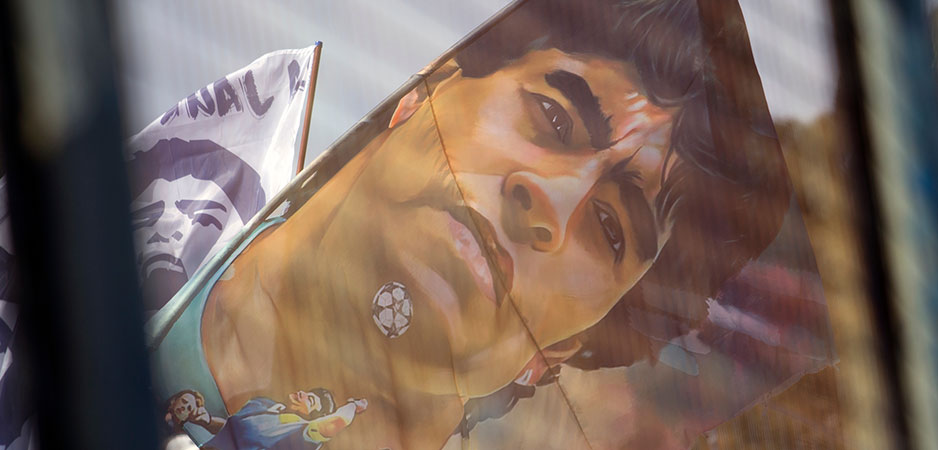Diego Maradona was an imperfect athlete, but a perfect celebrity athlete. His faults, inconsistencies, contradictions and oddities were clear in his playing years but became even clearer as he grew older. That’s why the media loved him and made him the most dazzling and fascinating footballer of the late 20th and early 21st centuries. The Argentinian star, who died on November 25 aged 60, personified a new age in which football, like many other sports, was being transformed into globally televised entertainment.
What Is Behind Football’s Persistent Racism?
He also embodied a new spirit in professional sport. Fair play was no longer sacrosanct — the new spirit was one of winning at all cost. But, most importantly, he was dangerous: Wherever Maradona strayed, there was risk and peril of some kind. Combined, they elevated from mere mortal to a stupendous emblem of a new age.
Unrepentant
Maradona seethed with volatility, the anarchy of his nature frequently subordinating nurture, or at least augmenting it. No incident better illustrates this than his belief-beggaring “Hand of God” goal of 1986. In a vicious payback for Argentina’s humiliation in the Falklands conflict four years before, Maradona forced the ball into the net in a World Cup game against England using foul, rather than fair, means. It was a move that, today, would be instantly invalidated and punished after video review.
In the mid-1980s, as Maradona later shamelessly admitted, “It was a nice feeling, like some sort of symbolic revenge against the English.” And the goal stood. An accident? No. “I knew it was my hand,” revealed the player, not in confession but in celebration. He was unrepentant for the rest of his life.
His public image in England will always be compromised by the foul, but elsewhere, he is acknowledged as one of the best, if not the best, football players of all time. Maradona will always be compared with his near-contemporary Pelé, 20 years his elder (now 80), also South American (Brazilian, in his case) and a far, far less perplexing character, who avoided playing in the European leagues. Maradona, by contrast, earned his spurs in Italy’s Serie A and Spain’s La Liga, two of the most competitive environments in football.
The comparison of the two players brings into relief the global media: association football, more than any other sport, was enthusiastically broadcast around the world in 1982 when 21-year-old Maradona arrived in Barcelona. Pelé had retired five years before, having spent his final years in the relatively undemanding and largely unseen US league. He was beige to Maradona’s explosion in a paint factory.
Football was beginning a transformation that would make it the world’s most popular and valuable sport, a marketing vehicle for major corporations and a den of most iniquitous corruption. Money was the common denominator, and Maradona was a (perhaps unwitting) emblem of this new age. Barcelona paid a then-world record $9.81 million to his Argentinian club Boca Juniors in 1982. Napoli paid Barcelona a then-record $12 million transfer fee for him in 1984 and, while in those days salaries were not disclosed, Maradona was almost certainly the world’s highest-paid player. Perhaps justifiably: He inspired Napoli to Serie A successes in 1987 and 1990 as well as in 1989’s UEFA Cup.
With Mike Tyson, Ben Johnson and Magic Johnson, Maradona became one of the preeminent athletes of the 1980s. Notice the similarities? Boxer Tyson was convicted of rape in 1992. Sprinter Ben Johnson was stripped of his Olympic gold medal in 1988 after testing positive for drugs. Basketball player Magic Johnson, in 1991, announced he was HIV positive. All were virtuosos in their chosen sports; all were arguably better known for matters either unrelated to sports or, in Ben Johnson’s case, transgressions.
Transgressions
Maradona had many of his own transgressive moments. Apart from the now-legendary “Hand of God,” Maradona made no secret of his political leanings and supported leftist leaders across Latin America, such as Cuba’s Fidel Castro, Venezuela’s Hugo Chavez and Bolivia’s Evo Morales. He provocatively befriended the revolutionary Castro and even had his image tattooed on his leg.
Son of a factory worker raised in a shantytown on the outskirts of Buenos Aires, Maradona, who was born in 1960, first met Castro in 1987 when basking in Argentina’s World Cup triumph. He identified with the dispossessed and found, in Cuba, a political system he apparently found well-matched with his own convictions. Maradona spent four years living in Havana, reputedly battling against substance dependency.
Drugs were a feature of Maradona’s life and, while they may ultimately have contributed to his downfall, they also ensured the media stayed on his case. He tested positive for cocaine in Italy in 1991 (resulting in a 15-month-long ban from football), was disqualified from the 1994 World Cup after another positive drug test and was rumored to use various illicit substances long after his playing days. He retired in 1997 after another drug scandal, claiming he had been framed. After that, Maradona had long spells of poor health and struggled with dependencies. Prior to his death, he was due to receive treatment for alcohol addiction.
Some athletes are remembered for their sports prowess; others for their antics; still others for both. Maradona was one such being: prodigiously talented but possessed of a turbulent streak that was, perhaps, ultimately self-destructive. A less celebrity-oriented media might have let him fade to obscurity, as they might any other serially-disgraced retired athlete. Not Maradona: He was far, far too newsworthy for a ravenous media that didn’t need to search for scraps — he kept serving up sumptuous repast.
Stories of his demons and misdemeanors kept us on alert. We knew his wouldn’t be a long and prosperous life. This is why we, as well as the media, loved him. Maradona was a flawless emblem of flawed celebrity: an athlete with all the gifts, yet without a clue how to conserve and nourish them.
*[Correction: An earlier version of this article mistakenly gave Maradona’s birth year as 1961. Updated 26/11/2020 at 18:28 GMT.]
*[Ellis Cashmore is the author of “Kardashian Kulture.”]
The views expressed in this article are the author’s own and do not necessarily reflect Fair Observer’s editorial policy.
Support Fair Observer
We rely on your support for our independence, diversity and quality.
For more than 10 years, Fair Observer has been free, fair and independent. No billionaire owns us, no advertisers control us. We are a reader-supported nonprofit. Unlike many other publications, we keep our content free for readers regardless of where they live or whether they can afford to pay. We have no paywalls and no ads.
In the post-truth era of fake news, echo chambers and filter bubbles, we publish a plurality of perspectives from around the world. Anyone can publish with us, but everyone goes through a rigorous editorial process. So, you get fact-checked, well-reasoned content instead of noise.
We publish 2,500+ voices from 90+ countries. We also conduct education and training programs
on subjects ranging from digital media and journalism to writing and critical thinking. This
doesn’t come cheap. Servers, editors, trainers and web developers cost
money.
Please consider supporting us on a regular basis as a recurring donor or a
sustaining member.
Will you support FO’s journalism?
We rely on your support for our independence, diversity and quality.






